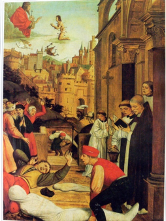Abstract
The present CoVid-19 pandemic has occupied our imagination and has affected our lives like never before. There had been pandemics before from ancient times that had profoundly affected and influenced human civilisation in every aspect known. Dynamics of pandemics have evolved as civilisation progressed and pandemics were often facilitated by technological advances. However, pandemics also were stark reminders of inequalities that have always existed in human society. Pandemics demand social distancing and social isolation for containment as they are spread by contagion and thus threaten human existence driven by a delicate social fabric.
This article traces the history of pandemics from the Roman times to the present day and presents an overview of these pandemics and their human cost.
References
Harris, SS. A Dictionary of Epidemiology, Fourth Edition. 2000; Oxford University Press, New York
Morens, DM et al. What is a pandemic? J Infect Dis. 2009; 200: 1018-1021. doi: 10.1086/644537)
Marcus Aurelius. Meditations. Full text available at athttp://classics.mit.edu/Antoninus/meditations.mb.txt accessed 19.05.2020 at 20.47pm
Edward Gibbon. Decline and Fall of the Roman Empire. 1988. Wordsworth Classics
Littman RJ, Littman LM. Galen and the Antonine Plague. The American Journal of Philology. 1973. 94: 243-255
Procopius. History of the Wars, Secret History, and Buildings. 1967. Trans. and ed. Averil Cameron New York: Washington Square Press Inc
Lotfy WM. Plague in Egypt: Disease biology, history and contemporary analysis: A minireview. Journal of Advanced Research. 2015; 6: 549-554
Joshua North, “The Death Toll of Justinian’s Plague and Its Effect on the Byzantine Empire,” Armstrong Undergraduate Journal of History. 2013; 3
Wong TW and Fung KP. The Plague Pandemics and the Discovery of the Plague Bacillus. Asia-Pacific Journal of Public Health 1988 - Vol2 No. 2
Levenstein J. Out of Bounds. Passion and the Plague in Boccaccio's Decameron. Italica. 1996; 73: 313-335
James T. Black Death: The lasting impact. 2011. http://www.bbc.co.uk/history/british/middle_ages/black_impact_01.shtml accessed 18.5.2020 at 10.32am
https://www.cbc.ca/news/technology/cholera-s-seven-pandemics-1.758504
Snowden FM. Epidemics and Society. Chapters 1,2,7 and 8. Yale University Press. 2019; https://www.jstor.org/stable/j.ctvqc6gg5.18
Latta T. The First Use of Intravenous Saline for the Treatment of Disease. International Journal of Epidemiology. 2013; 42: 387–390 https://doi.org/10.1093/ije/dyt045
Brabanti B , Dean KR et al. The Third Plague Pandemic in Europe. Proc. R. Soc. B. 286: 20182429. http://dx.doi.org/10.1098/rspb.2018.2429.
Kempińska-Mirosławska B., Woźniak-Kosek A. The influenza epidemic of 1889–90 in selected European cities – a picture based on the reports of two Poznań daily newspapers from the second half of the nineteenth century. Med Sci Monit, 2013; 19: 1131-1141; DOI: 10.12659/MSM.889469
Kilbourne ED. Influenza Pandemics of the 20th Century. Emerging Infectious Diseases. www.cdc.gov/eid • Vol. 12, No. 1, January 2006
Oxford JS et al. "A hypothesis: the conjunction of soldiers, gas, pigs, ducks, geese and horses in northern France during the Great War provided the conditions for the emergence of the "Spanish" influenza pandemic of 1918-1919" (PDF). Vaccine. 2005; 23 (7): 940–45. doi:10.1016/j.vaccine.2004.06.035. PMID 15603896
Jilani T et al. H1N1 Influenza (Swine Flu). https://www.ncbi.nlm.nih.gov/books/NBK513241/
Qiu W et al. The Pandemic and its Impacts. Health, Culture and Society. 2016-17; 9–10; DOI 10.5195/hcs.2017.221

This work is licensed under a Creative Commons Attribution-NonCommercial-NoDerivatives 4.0 International License.
Copyright (c) 2020 Array

